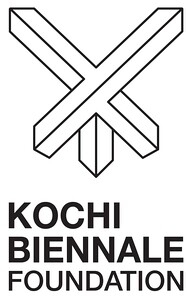Kochi-Muziris Biennale 2018
December 12, 2018–March 29, 2019
Today, the fourth edition of the Kochi-Muziris Biennale opens its gates to all, ushering in another season of art, conversation, and celebration. Titled Possibilities for a Non-Alienated Life, the Biennale will run until March 29, 2019, with over 100 projects displayed in heritage properties, public spaces, and galleries across Fort Kochi, Mattancherry, and Ernakulam on India’s southwestern coast.
On her vision for this edition, curator Anita Dube remarked, “From the conceptual level, to the embodied experience of the Biennale visitor, Possibilities for a Non-Alienated Life attempts to offer a platform that operates through radical openness. The exhibition—whose didactic model is complicated and liberated by a collaborative space called the Pavilion—is energised by the interactions between works, the dialogue sparked between artistic voices and practices. The audience is invited to share, to listen, and even to challenge the space.”
In keeping with the curatorial theme, Dube has invited some 94 practitioners from over 30 countries, forming a dynamic set of social contexts and artistic approaches. This edition also presents a new development in the model of the Biennale with regard to the participating artists. Through the Biennale platform, independent curators and mediators have created “infra-projects” that respond to or align with Dube’s larger thematic framework. These include Edible Archives curated by Anumitra Ghosh Dastidar and Prima Kurien, Sister Library by Aqui Thami, Srinagar Biennale by Veer Munshi, and a project by Durgabai Vyam + Subhash Vyam.
Several projects are shown outside the exhibition space, enlivening the urban fabric of Kochi, and creating a new type of public engagement. For instance, billboards by Andeel + Hassan Khan, commenting on specific socio-political contexts of Kerala through satirical cartoons, are visible in Ernakulam’s dense commercial areas. Canonical feminist artist-activists Guerrilla Girls have translated their tongue-in-cheek critiques of art institutions into Malayalam for the first time. Musical collective Oorali begin their tour along Kerala’s coastline, stopping in particular villages and towns to open out their specially-designed bus into a public workshop and performance space—an attempt to bring together and pay tribute to fishing communities, who were pivotal for relief and rescue efforts during the recent disastrous floods. Zanele Muholi’s striking photographic portraits of queer, black South Africans look out from the outer walls of Cabral Yard, the site of the Biennale Pavilion.
Along with being a site for ancillary programming—talks, film screenings, musical and other performances—the Pavilion takes on a crucial role in this edition. The space hosts a “knowledge laboratory,” an open platform for sharing and learning across media and languages. “There will be no hierarchies of knowledge, or stratifications of content. It is a space for safe disagreement, uncomfortableness, and unease, as much as it is one of pleasure, celebration, and exchange. At its core, the knowledge laboratory is an ever-developing learning experiment that cannot be realised without public participation.”
Kochi Biennale Foundation, in association with Foundation for Indian Contemporary Art (FICA) and Foundation for Indian Art & Education (FIAE), has developed Students’ Biennale, an exhibitory platform across multiple venues that runs parallel to Kochi-Muziris Biennale. This year marks the third edition of Students’ Biennale, which now involves a multilateral approach, featuring, in addition to the exhibition, an expanded education forum, and field-based research on the condition of art education as it stands. The exhibition involves some 200 projects by undergraduate and graduate students of Fine Arts under the broader theme of Making as Thinking. The projects are curated by six eminent artists and educators: Sanchayan Ghosh, Shukla Sawant, KP Reji, Shruti Ramalingaiah, Krishnapriya CP, and Nishad MP. Students’ Biennale is supported by Tata Trusts.
Running parallel to the Biennale is also the Pepper House Residency Exhibition, which sees the artists-in-residence this year return to Kochi to install their developed work, as well as a range of independently organised Collateral Projects.
For a full list of participating artists in Kochi-Muziris Biennale, please visit our website.
The calendar of programmes and events is available here.
For media enquiries, please contact press [at] kochimuzirisbiennale.org.

